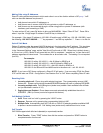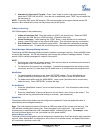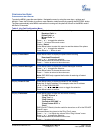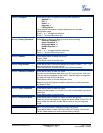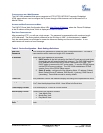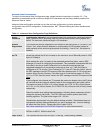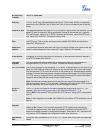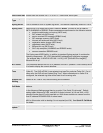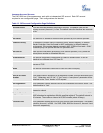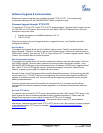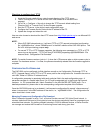
Default is 4 se
No Key Entry
Timeout
conds.
Use # as
This parameter allows users to configure the “#” key as the “Send” (or “Dial”) key. If set
Dial Key
to “Yes”, the “#” key will immediately send the call. In this case, this key is essentially
equivalent to the “(Re)Dial” key. If set to “No”, the “#” key is included as part of the dial
string.
This parameter defines the local RTP-RTCP port pair used to listen and transmit. It is the
Local RTP port
base RTP port for channel 0. When configured, channel 0 will use this port _value for
RTP and the port_value+1 for its RTCP; channel 1 will use port_value+2 for RTP and
port_value+3 for its RTCP. The default value is 5004.
Use Rando
This parameter, when set to “Yes”, will force random generation of both the local SIP
and RTP ports. This is usually necessary when multiple G
m
Port
XP-2000s are behind the
same NAT. Default is No.
Keep-alive
This parameter specifies how often the GXP-2000 sends a blank UDP packet to the SIP
server in order to keep the “hole” on the NAT open. Default is 20 seconds.
interval
Use NAT IP
NAT IP address used in SIP/SDP message. Default is blank.
STUN Server
IP address or Domain name of the STUN server. STUN resolution result will display in
the STATUS page of the Web UI.
This radio button will enable GXP-2000 to download firmware or configuration file
through either HTTP or local TFTP server. Choices are mutually exclusive.
Firmware
Upgrade
This is the IP address of the configured TFTP server. If selected and it is non-zero or not
blank, the GXP-2000 will attempt to retrieve a new configuration file or new code image
from the specified TFTP server at boot time. It will make up to 3 attempts before timeout
Via TFTP Server
and then it will start the boot process using the existing code image in the Flash memory.
If a TFTP server is configured and a new code image is retrieved, the new downloaded
image will be verified and then saved into the Flash memory.
Note: Grandstream strongly recommends that the user upgrade firmware locally in a
LAN environment if using TFTP to upgrade. Please do NOT interrupt the TFTP upgrade
process (especially the power supply) as this will damage the device.
The HTTP server URL used for firmware upgrade and configuration via HTTP. For
e
Via HTTP
xample: http://provisioning.mycompany.com:6688/Grandstream/1.1.1.14
Server
.
Here “:6688” is the specific TCP port that the HTTP server is using; omit if using default
port 80.
Note: If Auto Upgrade is set to No, GXP-2000 will only perform HTTP download once at
boot up.
This function is used by ITSP. End user should NOT touch these parameters.
Automatic
Upgrade
Default is No. Choose “Yes” to enable automatic HTTP upgrade and provisioning.
In “Check for upgrade every” field, enter the number of minutes to check the HTTP
server for firmware upgrade or configuration changes. When set to “No”, the phone will
only perform HTTP upgrade and configuration check once at boot up.
Enable the XML phonebook via TFTP or HTTP. Define XML server path and download
Phonebook
XML
speed.
Grandstream Networks, Inc. GXP-2000 Users Manual Page 21 of 33
Firmware 1.1.1.14 Last Updated: 12/2006



